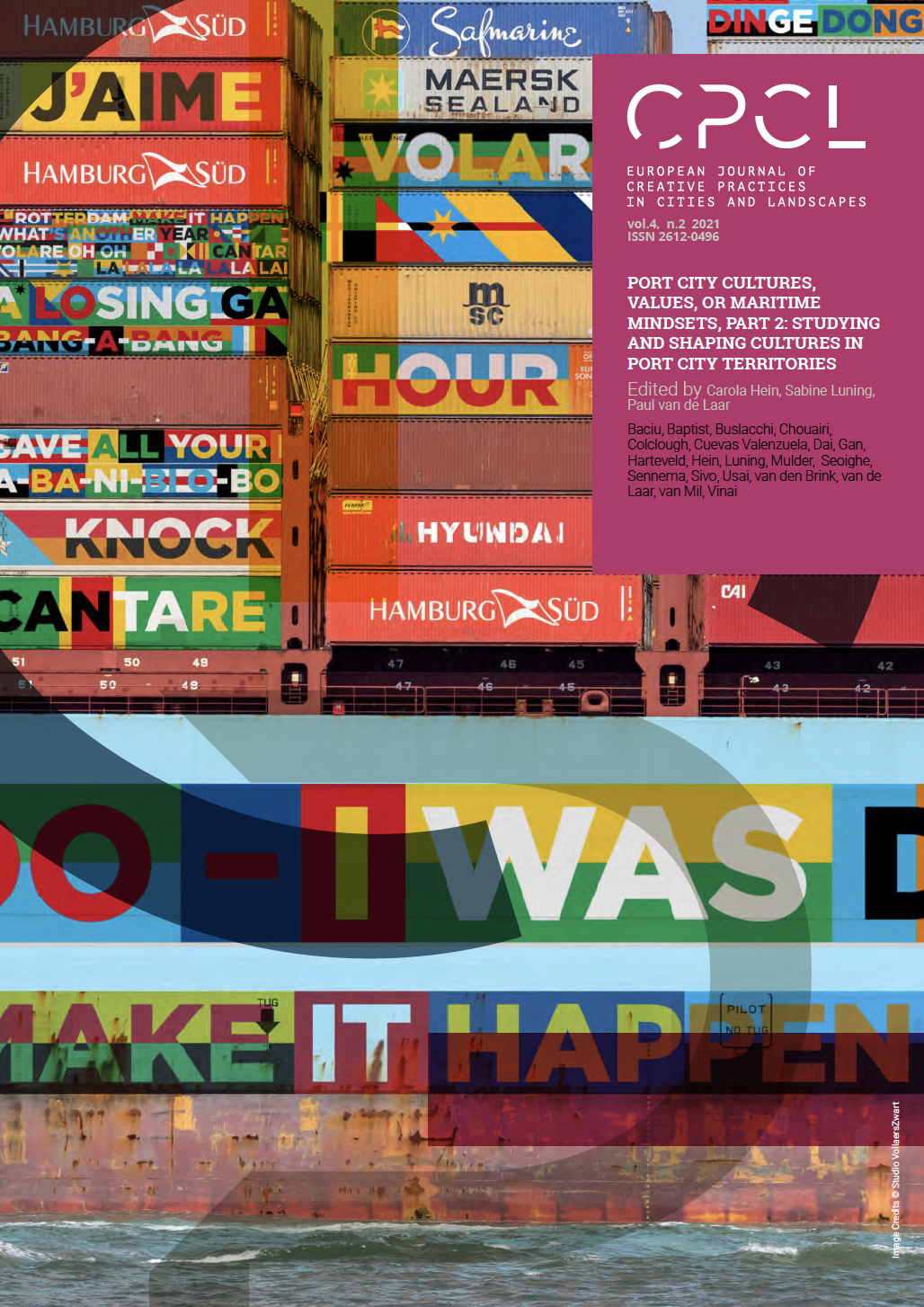The Maritime Mindset: A Conceptual and Practical Exploration of Mapping Port Cities
DOI:
https://doi.org/10.6092/issn.2612-0496/14141Keywords:
Mapping, Port Cities, Culture, Identity, Maritime MindsetAbstract
Centuries of trade have left their traces in the culture and society of port cities. This paper explores the usefulness of the concept “maritime mindset” to recognize these traces, and analyses it from different disciplinary perspectives. In the second part, it proposes the practice of “deep mapping” as a methodology of identifying and documenting expressions of maritime culture and trade in public space. In conclusion, it addresses some questions that are crucial when addressing a maritime mindset, such as whether it is a top-down or bottom-up mindset, which spatial scale it entails, and whose values and interests the mindset represents. Ultimately, we argue that (deep) mapping can play a role in producing a more layered spatial, social and cultural understanding of the complex nature of port cities.
References
Alaily-Mattar, Nadia. “Port Cities, Architecture and the Return to Water.” portcityfutures, November 30, 2020. https://www.portcityfutures.nl/news/port-cities-architecture-and-the-return-to-water.
Baptist, Vincent. “Deep Maps and Time Machines: Exciting Times for Collaborative Research on Port Cities.” portcityfutures, November 24, 2020. https://www.portcityfutures.nl/news/deep-maps-and-time-machines-exciting-times-for-collaborative-research-on-port-cities.
Bernecker, Katharina, and Veronika Job. “Mindset Theory.” In Social Psychology in Action: Evidence-Based Interventions from Theory to Practice, edited by Kai Sassenberg and Michael L.W. Vliek, 179–91. Cham: Springer, 2019. https://doi.org/10.1007/978-3-030-13788-5_12.
Bodenhamer, David J., John Corrigan, and Trevor M. Harris, eds. Deep Maps and Spatial Narratives. Bloomington and Indianapolis: Indiana University Press, 2015. https://doi.org/10.2307/j.ctt1zxxzr2.
Cardoso, Rodrigo V., and Evert J. Meijers. “Contrasts between First-Tier and Second-Tier Cities in Europe: A Functional Perspective.” European Planning Studies 24, no. 5 (May 3, 2016): 996–1015. https://doi.org/10.1080/09654313.2015.1120708.
Ducruet, César, and Sung-Woo Lee. “Frontline Soldiers of Globalisation: Port–City Evolution and Regional Competition.” GeoJournal 67, no. 2 (February 21, 2007): 107–22. https://doi.org/10.1007/s10708-006-9037-9.
Dweck, Carol S. “Implicit Theories.” In Handbook of Theories of Social Psychology, edited by Paul Van Lange, Arie Kruglanski, and Edward T. Higgins, Vol. 2. London: SAGE, 2012. https://doi.org/10.4135/9781446249222.
Gombrich, Ernst H. Art and Illusion: A Study in the Psychology of Pictorial Representation. 6° edizione. London and New York: Phaidon, 2002.
Hein, Carola. “Port City Resilience: (Re-)Connecting Spaces, Institutions and Culture.” portcityfutures, March 17, 2020. https://www.portcityfutures.nl/news/port-city-resilience-re-connecting-spaces-institutions-and-culture.
———. “The Port Cityscape: Spatial and Institutional Approaches to Port City Relationships.” PORTUSplus 8 (2019). https://portusplus.org/index.php/pp/article/view/190.
Hodos, Jerome I. Second Cities: Globalization and Local Politics in Manchester and Philadelphia. Philadelphia: Temple University Press, 2011.
Moretti, Beatrice. “Port City Discourse: A New Vocabulary for Research and Action.” portcityfutures, March 31, 2021. https://www.portcityfutures.nl/news/port-city-discourse-a-new-vocabulary-for-research-and-action.
Preziosi, Donald. The Semiotics of the Built Environment: An Introduction to Architectonic Analysis. Bloomington and London: Indiana University Press, 1979.
Rodrigue, Jean-Paul. “Transportation and the Geographical and Functional Integration of Global Production Networks.” Growth and Change 37, no. 4 (December 2006): 510–25. https://doi.org/10.1111/j.1468-2257.2006.00338.x.
Scholten, Peter, Maurice Crul, and Paul van de Laar, eds. Coming to Terms with Superdiversity: The Case of Rotterdam. Cham: Springer, 2019. https://doi.org/10.1007/978-3-319-96041-8.
Wang, James J. (王缉宪). Interaction and Development of China’s Port Cities (中国港口城市的互动与发展). Southeast University Press (东南大学出版社), 2010.
Downloads
Published
How to Cite
Issue
Section
License
Copyright (c) 2021 Hilde Sennema, Vincent Baptist, Tianchen Dai, Yingying Gan, Yvonne van Mil, Thomas van den Brink, Carola Hein

This work is licensed under a Creative Commons Attribution 4.0 International License.




